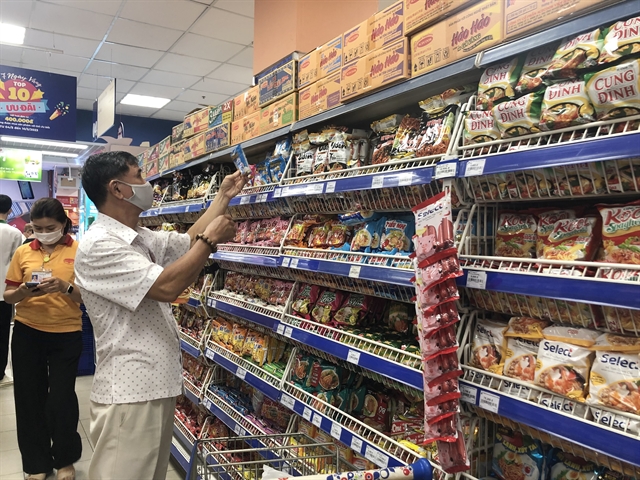 Economy
Economy

 |
| Customers shop at a supermarket in HCM City. Several key macro trends are shaping Việt Nam's FMCG landscape in 2024 and beyond. — VNS Photo |
HCM CITY — Economic outlook, demographic transformation and changing consumer trends are among macro shifts reshaping Việt Nam's fast-moving consumer goods landscape, according to marketing data and analytics company Kantar Worldpanel.
In its recent report on the Việt Nam FMCG market outlook 2024, Kantar has a positive outlook for Việt Nam’s economy, saying that despite obstacles and short-term headwinds, the long-term economic trajectory remains robust.
Nevertheless, rising costs have had and will continue to have an impact on shoppers’ budget management strategy. Value remains a key driver, with consumers making conscious choices about where to allocate their budgets.
“While rising prices and economic uncertainty may present a picture of tightened belts across the board, the consumer landscape is nuanced.
“Essential categories remain at the forefront of budgets, discretionary spending may see cuts, particularly in categories like eating out and entertainment.”
However, consumers have not entirely shut down their wallets, according to the report. They are still willing to "splurge," but their spending is driven by value.
Added values in health, experiences and convenience may prompt them to seek out products that justify their worth.
This presents a unique opportunity for FMCG brands to navigate challenging times and position themselves for growth.
The key lies in understanding how different consumer segments are adapting their behaviour and adopting strategies that cater to these shifts.
In addition, rising prices have led to a slowdown in in-home FMCG volume growth, even as average spending continues to rise. This raises the question: Is this increase driven solely by inflation, or are consumers changing their shopping baskets? Understanding the answer is crucial for developing effective marketing strategies.
Even in difficult times some brands thrive while others find growth elusive. While competitive pricing coupled with strategic promotions is a must, success in securing consumers’ share of wallet hinges on brands’ ability to seize the opportunities to offer consumers smarter solutions and value-driven choices.
As for the impact of changing demographics on the FMCG market, the report says Việt Nam's demographic structure is painting a new picture.
The once "golden population" is maturing, with an aging, urbanising population and smaller household sizes emerging.
This shift holds significant potential for FMCG businesses as demand for diverse products surges across different age clusters. Rising household incomes and decreasing household sizes, however, indicate a demand for evolving value proposition, where affordability might not be the sole driver.
Kantar suggested strategies for FMCG brands and manufacturers such as decoding drivers of changes in consumers’ shopping behaviour, mastering the multi-channel landscape, building a winning portfolio with consumer-centric innovation, and maximising promotions by focusing on quality over quantity.
Its data reveals that over half of FMCG brands struggled to keep pace with the competition in 2023, particularly within growing categories where approximately one-third of brands began to lag.
As competition intensifies in 2024, this highlights the urgent need for brands to identify their unique growth drivers to stay ahead of competition.
The FMCG retail landscape in Việt Nam is shifting to more convenient and modern formats but not all modern trade channels can win, according to the company.
To succeed, brands need to understand the reason behind a shopper's visit to each channel and adapt their approach accordingly.
With respect to building a winning portfolio with consumer-centric innovation, different strategies are required for different categories, depending on size, growth and competition landscape.
For FMCG manufacturers with a vast portfolio, identifying key categories to prioritise investments is crucial.
There are opportunities for rising FMCG categories as well as mature categories.
Finally, promotions are one of the most effective ways to drive immediate volume sales uplift though not all have the same impact.
By understanding the true effectiveness of different promotion types on brand growth, brands can harness the power of promotions to not only drive impact on revenue but also build brand loyalty. — VNS




